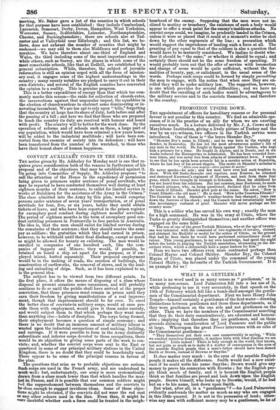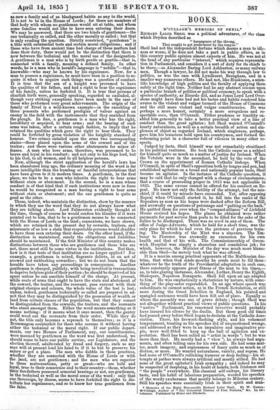WHAT IS A GENTLEMAN ?
THERE is no word used in so many senses as " gentleman," or in so many non-senses. Lord Palmerston fell into a lax use of it, while professing to use it very accurately, in that speech on the 19th of February which fell like a bomb-shell amongst the gentle- men of the Commissariat department. First we have Henry John Temple—himself certainly a gentleman of the first water—drawing distinctions between gentlemen and those three departments, as if they were gentlemen on the one side and not gentlemen on the other. Then we have the members of the Commissariat asserting that they do their duty conscientiously, are educated and honour- able ; implying that therefore they are gentlemen, and on these grounds claiming consideration of Lord Panmure and the public at large. Whereupon the great' Times intervenes with an echo of the Commissariat gentlemen- " They themselves put their own case unanswerably in saying, While we conduct ourselves honourably, it matters little with what families we are connected.' Little indeed ! There is folly enough in the world, God knows, but not quite so much as to make it a matter of consequence in the eyes of the sensible English people that a man's father should have been named Smith or Brown, instead of Browne or Smythe."
It does matter very much : in the eyes of the sensible English people it makes all the difference. Smith would feel a new exist- ence if he could write his name Smythe; Brown would give any money to prove his connexion with Browne ; for the English peo- ple think much of family, and it is because the English people think so that families are proud and look down upon the English people. Brown himself, who looks up to Browne, would, if he had but an e to his name, look down upon Smith. But what, after all, is a " gentleman "? —for Lord Palmerston evidently confounds the matter as much as any who are engaged in this little quarrel. It is not in the possession of land; other- wise any man with sufficient money may be a gentleman, be he of as,new a family and of as blachabits as any in the world. It is not to be in the House ofkLuarls ; for there are members of that body with whom no gentleman would sit at table, and whom some families would not like to have seen entering their doors. We may be answered, that there are two kinds of gentleman—the one technically so called, and the other morally so called : but that is only evading the question. Strictly construed, "gentleman" is a title with substantial tests and certain moral obligations • and if those who have from ancient time had charge of these matters had done their duty, there would not be the distinction that there is now between the technical and the moral use of the designation. A gentleman is a man who is by birth gentle or gentile—that is, connected with a family, meaning a defined family. In other words, he is a man who in herald's language is " nobilis "—that is, knowable—who may .be known by his cognizance. Now, for a man to possess a cognizance, he must have been in a position to ac- quire it when to acquire such things was a question of conduct. It is true that the son of a knight was presumed to have the qualities of his father, and had a right to bear the cognizance of his family, unless he forfeited it. It is true that persons of churlish birth were, generally speaking, regarded as excluded, al- though very striking exceptions, have been made in the case of those who performed very, great achievements. The origin of the family 'of Errol is a well-known example—in the ennobling of three peasants who performed prodigies of valour against an enemy in the field with the instruments that they snatched from the plough. In fine, a gentleman is a man who has the right, hereditary or acquired, to bear arms ; and the bearing of such arms was taken, after a certain rough fashion, to imply that he retained the qualities which gave the right to bear them. They could be forfeited by gross violation of the knightly standard of honour. Two crimes entailed upon the arms two corresponding stains—those placed upon the arms of the coward and of the traitor ; and there were various other abatements for minor of- fences. A man who bore arms, therefore, was presumed to be brave and loyal in his conduct ; and not only to his liege lord, but to his God, to all women, and to all helpless persons.
Now, although the strict application of the herald's laws has been abandoned long ago, the ordinary meaning of the word is far more intelligible than the humbug or fanciful interpretations that have been given to it in modern times. A gentleman, in the first place, we take to be a man who inherits the right to bear arms without stain or abatement. In the second, he is a man whose conduct is of that kind that if such institutions were now in force he would be recognized as a man having a right to bear arms without stain or abatement ; and the one gentleman is quite as good as the other.
Those, indeed, who maintain the distinction, show by the manner in which they use the word that they do not always know what they are talking about. Lord Palmerston evidently thought at the time, though of course he would confess his blunder if it were pointed out to him, that to be a gentleman means to be connected with the House of Lords or the land ; connexions, we have shown, which are retained in the present day by cowards, traitors, and miscreants of so low a stain that respectable persona would shudder to have them seen entering their doors. On the other hand, if the distinction is maintained, surely the obligations and liabilities should be maintained. If the first Minister of this country makes distinctions between those who are gentlemen and those who are not, there must still be some virtue in the institutions. But then, how is it that tests of that institution are no longer applied ? For example, a gentleman is seized, flagrante delieto, in an act of avowed and unblushing cowardice • but we do not learn that the heralds have taken any proceedings in consequence. Another gentleman is charged, pubhcly, with being involved in transactions to deprive helpless girls of their portion ; he should be deprived of his spurs unless he can assoilzie himself of the charge. At present, while coats of arms that ought to have the stain and abatement of the coward, the traitor, and the recreant, pass current with their original charges and colours, the whole value of the test is lost; unless, indeed, gentlemen technically so called are prepared to ad- mit that they may be distinguished by the possession of wealth or land from certain classes of the population, but that they cannot be distinguished from the cowards, the traitors, and the recreants who stand amongst them. Either the word means something or it means nothing : if it means what it once meant, then the gentry could weed out the recreants from their order. While they do not, the title only becomes a reproach to themselves ; as it is a Brummagem counterfeit for those who assume it without having either the technical or the moral right. If our public depart- ments, our two Houses of Parliament, nay, our constituencies, were manned by gentlemen as the word was first understood, we should cease to have our public service, our Legislature, and the election thereof, adulterated by fraud and forgery, such as any man will at present lend his hand to if it be but to preserve his salary or get a place. The men who dabble in these practices, whether they are connected with the House of -Lords or with the land, are not gentlemen ; and the men who are superior to those malversations, petty or great—who are bold and loyal, true to their conscience and to their country—these, whether their forefathers possessed armorial bearings or not, are gentlemen, in the technical as well as the moral sense of the word : only that our Sovereign, by disuse, seems to have forfeited the right to die. tribute her cognizances, and so to know her true gentlemen from the false.



























 Previous page
Previous page